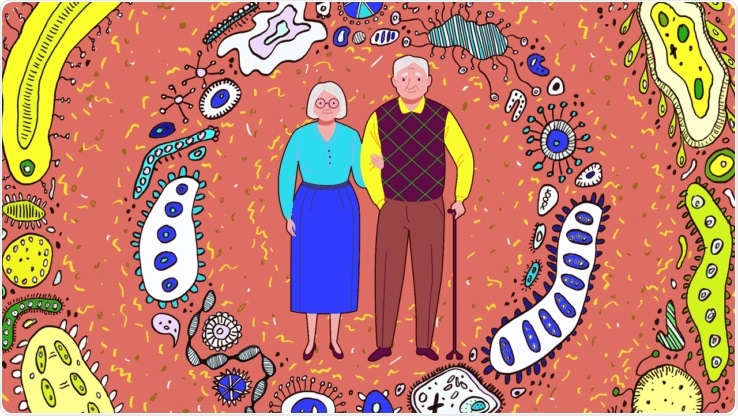The gut microbiome is considered an essential part of the body, but its significance in the human aging process is still vague.

Data from over 9,000 people reveal a distinct gut microbiome signature that is associated with healthy aging and survival in the latest decades of life. Image Credit: Institute for Systems Biology (ISB).
Scientists from the Institute for Systems Biology (ISB) and their colleagues have detected evident signatures in the gut microbiome that are linked to either unhealthy or healthy aging trajectories, which consequently estimate survival in a population of older adults. The study will soon be published in the Nature Metabolism journal.
The researchers examined the gut microbiome using clinical and phenotypic data from more than 9,000 people—aged between 18 and 101 years— across three separate cohorts. The researchers specifically focused on longitudinal data obtained from a cohort of more than 900 community-dwelling older adults (78 to 98 years old), enabling them to monitor survival and health outcomes.
The data revealed that gut microbiomes turned out to be more and more unique (that is, increasingly different from others) as people aged, beginning in mid-to-late adulthood, which correlated with a continued drop in the abundance of core bacterial genera (such as Bacteroides) that are likely to be shared across human beings.
Remarkably, while microbiomes turned out to be increasingly special to every person in healthy aging, the metabolic functions being carried out by the microbiomes shared common characteristics.
This unique signature of the gut was highly associated with many microbially-derived metabolites in blood plasma, such as the one— called tryptophan-derived indole—that has already been demonstrated to expand the mice’s lifespan.
Blood concentrations of another metabolite—called phenylacetylglutamine—demonstrated the most powerful correlation with uniqueness, and previous studies have demonstrated that this metabolite is undoubtedly highly elevated in centenarians’ blood.
This uniqueness signature can predict patient survival in the latest decades of life.”
Dr Tomasz Wilmanski, Study Lead and Research Scientist, Institute for Systems Biology
Healthy audits, about 80 years of age, displayed a steady microbial drift toward an unusual compositional state; however, this drift was not detected in less healthy persons.
Interestingly, this uniqueness pattern appears to start in mid-life - 40-50 years old - and is associated with a clear blood metabolomic signature, suggesting that these microbiome changes may not simply be diagnostic of healthy aging, but that they may also contribute directly to health as we age.”
Dr Tomasz Wilmanski, Study Lead and Research Scientist, Institute for Systems Biology
For instance, indoles decrease gut inflammation, and chronic inflammation is believed to be a key driver in the development of aging-related morbidities.
Prior results in microbiome-aging research appear inconsistent, with some reports showing a decline in core gut genera in centenarian populations, while others show relative stability of the microbiome up until the onset of aging-related declines in health.”
Dr Sean Gibbons, Study Co-Corresponding Author and Microbiome Specialist, Institute for Systems Biology
Dr. Gibbons continued, “Our work, which is the first to incorporate a detailed analysis of health and survival, may resolve these inconsistencies. Specifically, we show two distinct aging trajectories: 1) a decline in core microbes and an accompanying rise in uniqueness in healthier individuals, consistent with prior results in community-dwelling centenarians, and 2) the maintenance of core microbes in less healthy individuals.”
This study emphasizes the fact that the gut microbiome in adults continues to manifest with advanced age in healthy people but not in unhealthy individuals, and that the compositions of microbiome linked to health in early-to-mid adulthood are not likely to be compatible with health in late adulthood.
“This is exciting work that we think will have major clinical implications for monitoring and modifying gut microbiome health throughout a person's life,” concluded ISB Professor Dr Nathan Price, the co-corresponding author of the study.
Source:
Journal reference:
Wilmanski, T., et al. (2021) Gut microbiome pattern reflects healthy ageing and predicts survival in humans. Nature Metabolism. doi.org/10.1038/s42255-021-00348-0.